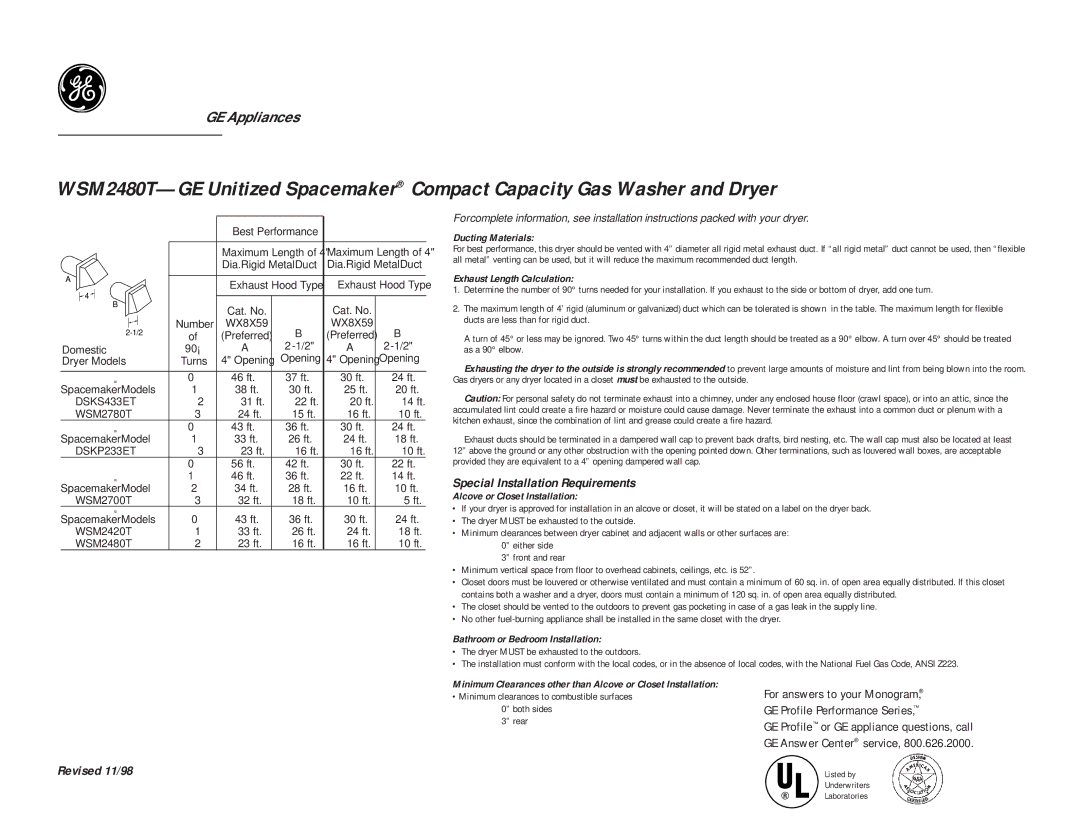
GE Appliances
|
|
|
|
| Best Performance |
|
| |
|
|
|
|
|
|
|
|
|
|
|
|
|
| Maximum Length of 4" | Maximum Length of 4" | ||
|
|
|
|
| Dia. Rigid Metal Duct | Dia. Rigid Metal Duct | ||
A |
|
|
|
|
|
| ||
|
| Exhaust Hood Type | Exhaust Hood Type | |||||
|
|
|
|
| ||||
|
|
|
|
|
|
|
|
|
4 | B |
|
|
|
|
|
| |
|
|
|
| Cat. No. |
| Cat. No. |
| |
|
|
|
|
|
|
| ||
|
|
| Number | WX8X59 | B | WX8X59 | B | |
|
|
| of | (Preferred) | (Preferred) | |||
|
|
|
| |||||
Domestic |
| 90° | A | 2 | A | 2 | ||
Dryer Models |
| Turns | 4" Opening | Opening | 4" Opening | Opening | ||
|
|
|
|
|
|
|
|
|
® | Models | 0 | 46 ft. | 37 ft. | 30 ft. | 24 ft. | ||
Spacemaker | 1 | 38 ft. | 30 ft. | 25 ft. | 20 ft. | |||
DSKS433ET | 2 | 31 ft. | 22 ft. | 20 ft. | 14 ft. | |||
WSM2780T | 3 | 24 ft. | 15 ft. | 16 ft. | 10 ft. | |||
® | Model | 0 | 43 ft. | 36 ft. | 30 ft. | 24 ft. | ||
Spacemaker | 1 | 33 ft. | 26 ft. | 24 ft. | 18 ft. | |||
DSKP233ET | 3 | 23 ft. | 16 ft. | 16 ft. | 10 ft. | |||
|
|
|
| 0 | 56 ft. | 42 ft. | 30 ft. | 22 ft. |
® | Model | 1 | 46 ft. | 36 ft. | 22 ft. | 14 ft. | ||
Spacemaker | 2 | 34 ft. | 28 ft. | 16 ft. | 10 ft. | |||
WSM2700T | 3 | 32 ft. | 18 ft. | 10 ft. | 5 ft. | |||
® | Models | 0 | 43 ft. | 36 ft. | 30 ft. | 24 ft. | ||
Spacemaker | ||||||||
WSM2420T | 1 | 33 ft. | 26 ft. | 24 ft. | 18 ft. | |||
WSM2480T | 2 | 23 ft. | 16 ft. | 16 ft. | 10 ft. | |||
For complete information, see installation instructions packed with your dryer.
Ducting Materials:
For best performance, this dryer should be vented with 4” diameter all rigid metal exhaust duct. If “all rigid metal” duct cannot be used, then “flexible all metal” venting can be used, but it will reduce the maximum recommended duct length.
Exhaust Length Calculation:
1.Determine the number of 90° turns needed for your installation. If you exhaust to the side or bottom of dryer, add one turn.
2.The maximum length of 4’ rigid (aluminum or galvanized) duct which can be tolerated is shown in the table. The maximum length for flexible ducts are less than for rigid duct.
A turn of 45° or less may be ignored. Two 45° turns within the duct length should be treated as a 90° elbow. A turn over 45° should be treated as a 90° elbow.
Exhausting the dryer to the outside is strongly recommended to prevent large amounts of moisture and lint from being blown into the room. Gas dryers or any dryer located in a closet must be exhausted to the outside.
Caution: For personal safety do not terminate exhaust into a chimney, under any enclosed house floor (crawl space), or into an attic, since the accumulated lint could create a fire hazard or moisture could cause damage. Never terminate the exhaust into a common duct or plenum with a kitchen exhaust, since the combination of lint and grease could create a fire hazard.
Exhaust ducts should be terminated in a dampered wall cap to prevent back drafts, bird nesting, etc. The wall cap must also be located at least 12” above the ground or any other obstruction with the opening pointed down. Other terminations, such as louvered wall boxes, are acceptable provided they are equivalent to a 4” opening dampered wall cap.
Special Installation Requirements
Alcove or Closet Installation:
•If your dryer is approved for installation in an alcove or closet, it will be stated on a label on the dryer back.
•The dryer MUST be exhausted to the outside.
•Minimum clearances between dryer cabinet and adjacent walls or other surfaces are:
0” either side 3” front and rear
•Minimum vertical space from floor to overhead cabinets, ceilings, etc. is 52”.
•Closet doors must be louvered or otherwise ventilated and must contain a minimum of 60 sq. in. of open area equally distributed. If this closet contains both a washer and a dryer, doors must contain a minimum of 120 sq. in. of open area equally distributed.
•The closet should be vented to the outdoors to prevent gas pocketing in case of a gas leak in the supply line.
•No other
Bathroom or Bedroom Installation:
•The dryer MUST be exhausted to the outdoors.
•The installation must conform with the local codes, or in the absence of local codes, with the National Fuel Gas Code, ANSI Z223.
Minimum Clearances other than Alcove or Closet Installation: | For answers to your Monogram,® |
•Minimum clearances to combustible surfaces | |
0” both sides | GE Profile Performance Series,™ |
3” rear | GE Profile™ or GE appliance questions, call |
| GE Answer Center® service, 800.626.2000. |
Revised 11/98
R
Listed by Underwriters Laboratories
